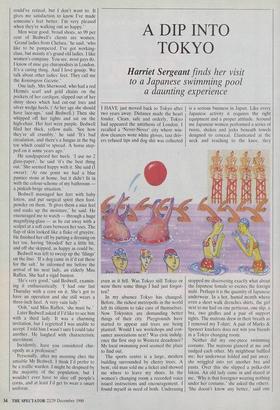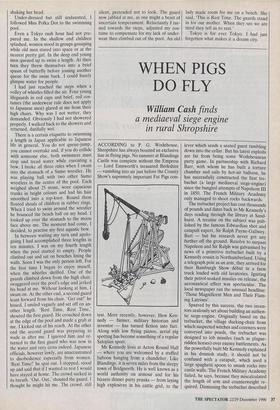A DIP INTO TOKYO
Harriet Sergeant finds her visit
to a Japanese swimming pool a daunting experience
I HAVE just moved back to Tokyo after two years away. Distance made the heart fonder. Clean, safe and orderly, Tokyo had appeared the antithesis of London. I recalled a 'Never-Never' city where win- dow cleaners wore white gloves, taxi driv- ers refused tips and dog shit was collected even as it fell. Was Tokyo still Tokyo or were there some things I had just forgot- ten?
In my absence Tokyo has changed. Before, the richest metropolis in the world left its citizens to take care of themselves. Now Tokyoites are demanding better things of their city. Playgrounds have started to appear and trees are being planted. Would I see workshops and con- sumer associations next? Was civic indulg- ence the first step to Western decadence? My local swimming pool seemed the place to find out.
The sports centre is a large, modern building surrounded by cherry trees. A bent, old man sold me a ticket and showed me where to leave my shoes. In the women's changing room a recorded voice issued instructions and encouragement. I found myself in need of both. Undressing is a serious business in Japan. Like every Japanese activity it requires the right equipment and a proper attitude. Around me Japanese women performed a series of twists, shakes and jerks beneath towels designed to conceal. Elasticated at the neck and reaching to the knee, they stopped me discovering exactly what about the Japanese female so excites the foreign male. Perhaps it is the quantity of Japanese underwear. In a hot, humid month where even a short walk drenches shirts, the girl next to me had on one petticoat, one slip, a bra, two girdles and a pair of support tights. The matrons drew in their breath as I removed my T-shirt. A pair of Marks & Spencer knickers does not win you friends in a Tokyo changing room.
Neither did my one-piece swimming costume. The matrons glanced at me and nudged each other. My neighbour baffled me: her underwear folded and put away, she wriggled into yet another bra and pants. Over this she slipped a polka-dot bikini. An old lady came in and stared at me, 'Why is that foreigner wearing nothing under her costume,' she asked the others. 'She doesn't know any better,' said one shaking her head.
Under-dressed but still undaunted, I followed Miss Polka Dot to the swimming pool.
Even a Tokyo rush hour had not pre- pared me. In the shallow end children splashed, women stood in groups gossiping while old men stared into space or at the nearest pretty girl. In the deep end young men queued up to swim a length. At their turn they threw themselves into a brief spasm of butterfly before joining another queue for the swim back. I could barely glimpse water for people. I had just reached the steps when a volley of whistles filled the air. Four young lifeguards in red caps and brief, red cos- tumes (the underwear rule does not apply to Japanese men) glared at me from their high chairs. Why was I not wetter, they demanded. Obviously I had not showered properly. I walked back to the showers and returned, dutifully wet.
There is a certain etiquette to swimming a length in Japan applicable to Japanese life in general. You do not queue-jump, you cannot overtake and, if you do collide with someone else, both swimmers must stop and tread water while executing a bow. I broke all three rules when I swam into the stomach of a Sumo wrestler. He was playing ball with two other Sumo wrestlers in the centre of the pool. Each weighed about 25 stone, wore capacious trunks in bright colours and had his hair smoothed into a top-knot. Round them floated shoals of children in rubber rings. When I tried to swim around the wrestler he bounced the beach ball on my head. I looked up over the stomach to the moon face above me. The moment had come, I decided, to practise my first aquatic bow.
In between waiting my turn and apolo- gising I had accomplished three lengths in ten minutes. I was on my fourth length when the pool started to empty. People climbed out and sat on benches lining the walls. Soon I was the only person left. For the first time I began to enjoy muself, when the whistles shrilled. One of the guards climbed down from the high chair, swaggered over the pool's edge and jerked his head at me. Without looking at him, I swam on. At the other end, a second guard leant forward from his chair. 'Get out!' he hissed. I smiled vaguely and set off on an- other length. 'Rest Time, Rest Time,' shouted the first guard. He crouched down at the edge of the pool and made a grab at me. I kicked out of his reach. At the other end the second guard was preparing to wade in after me. I ignored him and re- turned to the first guard who was now in the water and very cross indeed. Japanese officials, however lowly, are unaccustomed to disobedience especially from women. `Rest Timer he spat out. I stopped, stood up and said that if I wanted to rest I would have stayed at home. The crowd sucked in its breath. 'Out. Out,' shouted the guard. I thought he might hit me. The crowd, still silent, pretended not to look. The guard now jabbed at me, as one might a beast of uncertain temperament. Reluctantly I tur- ned towards the steps, adjusted my cos- tume to compensate for my lack of under- wear then climbed out of the pool. An old I lady made room for me on a bench. She said, 'This is Rest Time. The guards stand in for our mother. When they see we are tired they tell us to rest.'
Tokyo is for ever Tokyo. I had just forgotten what makes it a dream city.



































































































 Previous page
Previous page